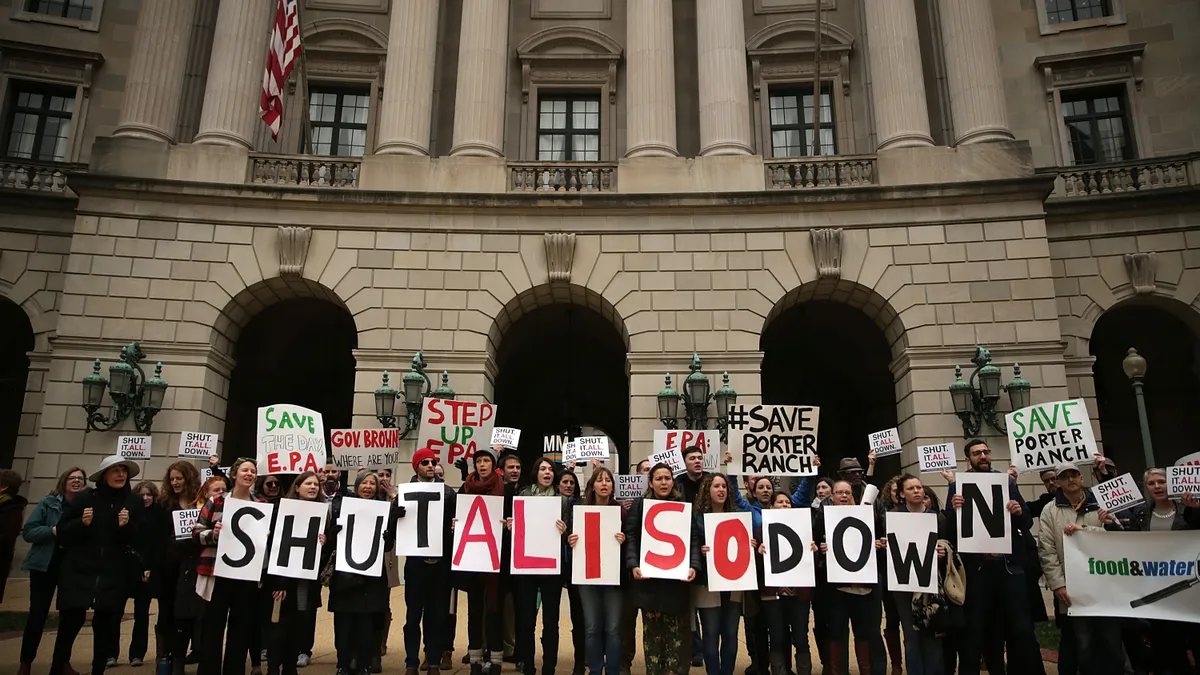Dive Brief:
- The California Public Utilities Commission (CPUC) voted unanimously on Thursday to allow Southern California Gas Co. (SoCalGas) to increase the amount of gas storage at the Aliso Canyon facility from 34 billion cubic feet (Bcf) to a little over 41 Bcf, amid concerns about energy reliability this winter.
- The move was criticized by multiple groups and residents of Southern California, who have been calling on regulators to shut down the Aliso Canyon facility following a gas leak that occurred there in 2015. However, the commission's decision does not diminish regulators' ability to take steps to decommission the storage field, CPUC Commissioner Martha Guzman Aceves said.
- Guzman Aceves noted that if California has an extremely cold winter along with the rest of the West, the state could face curtailments. "Like many decisions, this is not one that I had hoped or planned for — but it is one that we must take," she said.
Dive Insight:
The CPUC opened a proceeding to evaluate the possibility of weaning off the Aliso Canyon storage field in the wake of the 2015 gas leak, which released more than 100,000 tons of methane into the air. The commission in recent years has maintained the maximum storage level at Aliso Canyon at 34 Bcf, but in October, released two proposals that would increase that cap in an effort to ensure that the Los Angeles Basin has adequate supplies of natural gas this winter.
One proposed decision, from an administrative law judge, sought to increase the maximum storage capacity at Aliso Canyon to 68.6 Bcf. Guzman Aceves' alternate recommended a 41.16 Bcf cap instead.
The new storage limit at Aliso Canyon is "an interim solution" for the upcoming winter season, the commission's decision states, and regulators intend to revisit the question down the line.
The agency also acknowledged the many arguments to close down the Aliso Canyon facility immediately, and noted that it is reviewing analysis on a portfolio of resources that could replace the storage field in the long term.
"In the meantime, however, the record shows that continuing to rely on Aliso Canyon is necessary to protect customers from natural gas reliability issues and rate impacts for both natural gas and electricity in the current timeframe, and until any mitigation of these potential reliability and cost risks is completed," the decision stated.
California has been experiencing extreme heat and drought that have impacted the availability of hydroelectricity and created greater short-term dependency on natural gas generation, Guzman Aceves said at the agency's Thursday meeting.
"[G]iven the information in front of us today, I believe that in order to address all of the competing interests that we're dealing with, the [41 Bcf limit] is the best decision for the short term," Commissioner Darcie Houck agreed.
"With projections for higher than normal natural gas prices nationwide and repair work on an interstate pipeline limiting natural gas supplies to our region, SoCalGas storage facilities, including Aliso Canyon, will play a key and essential role in delivering reliable energy and keeping energy prices stable for Southern Californians this winter," said Christine Detz, a spokesperson for SoCalGas, in an emailed statement.
But non-government organization group Food & Water Watch criticized the decision as both dangerous and unnecessary.
California Gov. Gavin Newsom, D, "has made it clear that Aliso Canyon should be shut down. Now he must follow his mandate with action and ensure the CPUC closes this facility once and for all," Alexandra Nagy, the group's California director, said in a statement.














